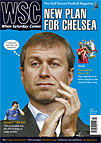 Points deductions have set the agenda in League One, writes Huw Richards
Points deductions have set the agenda in League One, writes Huw Richards
This was the Year of the Asterisk, with three teams – Leeds, Luton and Bournemouth – suffering points deductions. It also saw our Premier League-fixated national media, not for the first time, missing the point lower down. Hypnotised by the spectacle of Leeds and Nottingham Forest, regarded as Premier League members-in-exile, so far down the tree, they ignored the fact that much of the season was dominated, and the best-quality football played, by teams with a radically different provenance. Doncaster and Carlisle have both spent time in the Conference, while Swansea nearly went there only five years ago. If nobody quite reached the sublime heights attained by Blackpool in the later stages of 2006-07, there was some genuine quality.
It was a very good year, I can confirm, to be a Swansea fan. Following Southend and Scunthorpe’s triumphs in the previous seasons, Swansea’s title continued the extraordinary apotheosis of the League Two Class of 2005 (please don’t remind me what happened to them next. I know and I don’t want to think about it). Like them the Swans had a dominant striker. Jason Scotland, one of Roberto Martínez’s remarkably effective crop of summer signings, scored 24 goals. This still failed to convince many of the Liberty Stadium’s dim and witless, misled by a somewhat languid style into regarding a remarkably industrious attacker as lazy.
The Liberty did not, though, generally see the best of the Swans. If one pleasure of this season was the team’s conformity to Martínez’s belief that football should be played at all – above all the most difficult – times, another was victories at places such as Huddersfield, Hartlepool, Gillingham and Bristol Rovers, previously only associated with misery and defeat.
It was as well, though, that the Swans were not playing in a competition prefixed “Blue Square”. They would probably have been relegated. The FA Cup defeat at Havant was the logical conclusion to a sequence that took in falling behind at Billericay and drawing with Horsham. Even this, though, turned to advantage as expectations of a distracting visit to Anfield were replaced by the scheduled trip to Doncaster and a 4-0 win that, together with the 3-2 ten-man Christmas defeat of Leeds, was one of the season’s key tipping points.
Doncaster were, it was clear even that Friday night, a great deal better than that, an impression underlined by their 5-1 play-off immolation of tidily competent Southend. Paul Heffernan impressed at Swansea even in a losing team, while Richie Wellens (signed by the eventual play-off winners from Oldham) was the only player to retain his place in the PFA divisional select.
Carlisle were undone by their late-season slump and a failure to drive home their play-off advantage at Leeds, but had in Keiren Westwood the division’s best keeper. Both lost out for automatic promotion to fast-finishing Forest, who may have surprised even themselves after looking out of it. Leeds also finished fast – and had started even faster. They made no great efforts to make friends, in the manner of those who feel they are slumming and don’t plan to stay long – things didn’t quite work that way – and the season’s soundtrack was disfigured by the constant whining noise emitted by Ken Bates. The people with a real grievance were their fans. Many might have paid 15 points to be shot of Ken. Instead that was the price they were levied for the financial devices that kept him in control.
Still, there was much to admire in the way Gary McAllister got his team both playing football and winning after an understandably tricky transition from Dennis Wise’s approach. For all Leeds’ complaints, the really unlucky teams were the other victims of the asterisk. Luton were disembowelled by the receiver. Bournemouth seemed almost inspired by their ill-fortune and may be the best team ever relegated to League Two. This is, though, no guarantee of a fast return – just ask Gillingham, down again not long after being unluckily relegated from the Championship.
Elsewhere, Yeovil copped the hangover that can come with play-off failure, Orient neatly inverted their 2006-07 form with a brilliant start and flat finish and Bristol Rovers were the division’s FA Cup heroes – midfielder Chris Lines impressing almost as much at Fulham as their massed, passionate fans. Tranmere and Oldham looked good, but were always just off the pace, while Walsall were thwarted by poor home form. Huddersfield and Millwall head the Could Do Better category, Cheltenham continued to defy conventional wisdom by staying up again and Crewe must hope their gentle decline has bottomed out after surviving thanks to asterisks elsewhere.
From WSC 257 July 2008